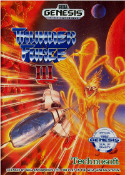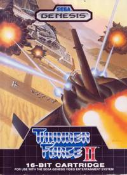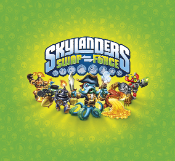Lightning strikes thrice.
A while back when I officially started collecting retro consoles and games, I swore that I’d never become one of those elitists in the gaming community who always makes a big deal about his vast, all-encompassing knowledge of video games; at least not in public. However, in my own mind, I was the master of all things retro. Well, that all came to a screeching halt in recent years thanks to Wikipedia when I discovered that, aside from owning the fifth game in the series, I knew next to nothing about the Thunder Force saga. As I learned of its existence on Sega's 16-bit console, it became painfully clear that I had barely gotten my toes wet with Technosoft’s bread and butter. How I missed it back in the day, I will never know. But after playing Thunder Force III, I soon realized that there was a whole ocean I was missing out on: the Genesis was the system for shoot-‘em-ups.
A Star Fox clone this is not.
Looks can be deceiving, particularly in the case of 3D Galaxy Force II. After watching a bit of footage of the game, I thought I was in for a fantastic Star Fox-like experience, piloting through space, taking down enemies and battling epic bosses at the conclusion of each level. While these are things you’ll do throughout the game, it never exhibits the finesse of the Star Fox series and the imprecise controls ensure that most players aren’t going to get much out of this particular 3D Classic.
If there was one thing that Techno Soft did very well in the 16-bit days, it was shoot ‘em ups. It all started when they created Thunder Force in 1984. It was released on the NEC PC-8801 and several other Japanese home computers at the time, but never saw the light of day in the US. The game featured an overhead free-roaming viewpoint and the goal was to destroy the enemy’s shield generators, using your main shot for air targets and the bomb shot for ground targets in each stage. While it’s tough to gauge the game’s popularity from back then, it apparently did well enough to warrant a sequel. Thunder Force II was released four years later for the Sega Genesis in 1989, making it the very first shoot ‘em up on the system.
The fire department is on its way.
Another year, another Skylanders game.
Three years later and the Skylanders craze is still in full swing. From kids to adults, it seems that everyone loves collecting and playing with these colorful characters. The latest iteration of the series brings a new wrinkle to the toys as well as to the game, but neither truly changes the tried-and-true formula. Platforming mechanics add a bit more depth to the traversal and combat mechanics, while the swap ability makes it a bit more fun to play with the physical toys by mixing and matching tops and bottoms. There’s no doubt that the whole kit is quite nifty, but as a game, Skylanders Swap Force still leaves something to be desired.








